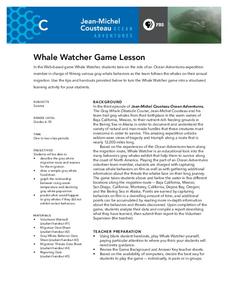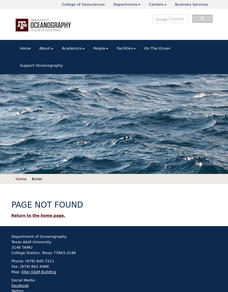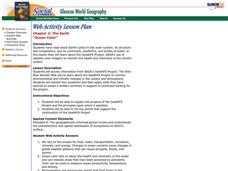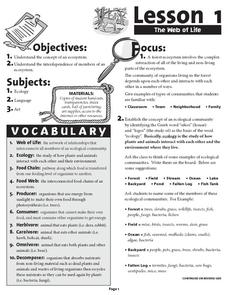Curated OER
Animals of the Fire Ice
Students examine ocean life by identifying methane hydrates. In this ocean life lesson, students research organisms that live in the coldest, deepest parts of the ocean and live off methane hydrates. Students create a group...
Curated OER
Tracking Ocean Ecology
Students look at the data maps given to them about how chlorophyll affects the algae blooms and make predictions about the harm they will cause. In this data maps lesson plan, students manipulate data sets from the website.
Teach Engineering
The Great Pacific Garbage Patch
The Great Pacific Garbage Patch is one of several garbage patches around the world where garbage accumulates naturally. As part of a GIS unit that combines oceanography, environmental science, and life science, class members investigate...
Curated OER
Sea Connections: Marine Ecosystems
Young scholars identify producers and consumers from marine ecosystems and describe the balance among them in the environments. After constructing a food chain from a marine ecosystem, they examine human activities that can upset the...
Curated OER
Water is Life
Krill is a very small ocean animal that is key to keeping the ocean ecosystem going. The class reviews food webs and chains, learns about the importance of krill, discusses krill anatomy, builds a model of a krill, and then has a...
Curated OER
Amphipod Ecology
Students count amphipods under kelp wracks of varying ages to explain how long it takes for them to find their food source. They collect and represent the data.
Curated OER
Lesson 9 - Along Our Coast
Students study the benefits of estuaries. They construct a saltwater food web, and complete worksheets and a quiz.
Curated OER
Whale Watcher Game Lesson
Students study the gray whale migration and compare their populations to the increasing ocean temperature. In this whale watcher lesson students draw a food chain.
Curated OER
Fisheries
Students research and report on the ocean's problems of disappearing or diminishing species around the world. students examine ecosystems and food chains and present their findings to a mock panel of science experts.
Curated OER
Along Our Coast
Students explore the coast lines of Florida. They examine the benefits of estuaries and examine the estuary systems found along the coast. Students research and construct a saltwater food web.
Curated OER
Reef Sharks!
Pupils visit an ocean aquarium exhibit where they can observe Black tip reef sharks. They observe the shark's behavior and read any information exhibited on the walls. They complete a worksheet based on information collected.
Science Matters
That’s An Otter Story
Young scientists discover how sea otters' habitats have changed due to human impact. Through conversation, video observation, and story reading, scholars identify how human interactions change a specific ecosystem in both positive and...
Curated OER
Feeding in the Flow
The National Oceanic and Atmospheric Administration (NOAA) has developed a tremendous library of ocean-themed lessons that can be used in a variety of science settings. "Feeding in the Flow" is one of those activities; Its focus is on...
Curated OER
Plankton / Phytoplankton
Students discuss the importance of plankton in the ocean ecosystem. In this biology activity, students identify the different types plankton by observing them under the microscope. They explain how plankton population affect global climate.
Curated OER
Hawaii's Freshwater Animals - Species Report
Students explore biology by creating a report for the class. In this oceanography lesson, students research and identify the survival characteristics of a list of freshwater animals by utilizing the Internet and library. Students...
Curated OER
Coral Reefs Endangered
Students research where in the world coral reefs are located. In this ecology lesson, students create food chains and food web. They simulate growing coral reefs to understand their characteristics better.
Curated OER
Sea Connections
Students, after locating different marine habitats on a globe, play a card game about ecosystems, food webs and organisms.
NOAA
What's the Difference?
Due to the isolation of seamounts, their biodiversity offers a great deal of information on the development of biological and physical processes. Pupils use simple cluster analysis to rate the similarity and differences in biological...
Curated OER
Camouflage, Protection, & Adaptations—Who am I?
Students explore ocean animal adaptations. In this animal adaptations lesson, students examine how different ocean animals use adaptations other than camouflage to protect themselves.
Curated OER
The Living Environment
Fourth graders make a chart of animals and plants that live in either the desert, the ocean, or the tundra. In this environment lesson plan, 4th graders work in groups to discover characteristics needed for these animals to live in that...
Curated OER
Ocean Color
Students examine NASA's SeaWiFS Project Web site to explore how the SeaWiFS Project monitors environmental and climatic changes in the oceans and atmosphere. They answer questions and write a summary in support of continued funding for...
Curated OER
The Web of Life
Students participate in a game in which they discover the balance of life in the ocean. They identify different organisms that rely on different types of food. They answer questions to complete the lesson.
Curated OER
Head to Foot
Students describe the body form and major anatomical structures of squids and describe some unusual or unique features of newly-discovered deep water squid species. They infer what types of food squids use from their anatomical features.
Curated OER
Sinking Races
Students build plankton models and compete to see which sinks most slowly. They write, or orally present ,the adaptations they incorporated to slow the sinking rate of their organisms. Race results can be grounds for some prizes!
Other popular searches
- Ocean Food Chain Pictures
- Atlantic Ocean Food Chain
- Ocean Food Chain Diagram
- The Ocean Food Chain
- Open Ocean Food Chain
- Pacific Ocean Food Chains
- Food Chain Ocean Pollution
- Food Chain in the Ocean
- Ocean Food Chains and Webs
- Food Chain Ocean Biome
- Food Chain Ocean
- Food Chain of the Ocean

























